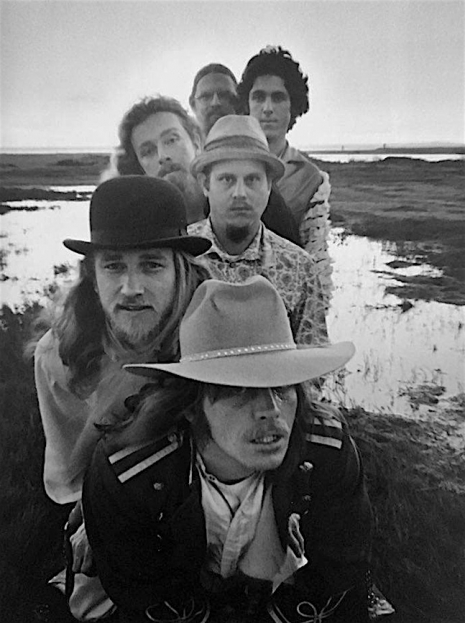
The Roto-Rooter Good Time Christmas Band was one of the best, almost long-lost bands of the early 1970s. Six ace performers who spent their time busking on the streets of LA before winning over fans and followers across America. Yet, even with such success, the Roto-Rooter Good Time Christmas Band never reached the heights of fame and success they so richly deserved.
Here’s their story as told by Lil’ Orphan Ollie, trumpeter, drummer, and original founder of the band.
Rule #1: Form a Band.
It started out this way: A bunch of guys outta UCLA blasting Christmas carols on the streets of LA. It was holiday season and they wanted money to buy presents for Santa and booze for his reindeer. Lil’ Orphan Ollie was trombone player and chief ring leader.
Lil’ Orphan Ollie: I thought I’d get three of my buddies and we’d go down and play some Christmas carols at the shopping center. People weren’t working too much. We were just out of college, and my recollection is it was December 1971,
I called up all my trombone buddies, we had a long association of playing together at UCLA, there’s no competition for this, but we were probably the best trombone players in the country.
When you get out of school and you’re a horn player the only opportunity you have for some steady work is to go on the road with various bands—Buddy Rich’s Band, Woody Herman, Count Basie and Duke Ellington—big bands like that. So some of us got some road work some of us didn’t. I’d just got back from playing My first trip on the road was with Louie Bellson Big Band—he was really a dynamic drummer
I said we should go and play some Christmas carols. We did that. My wife was pregnant with our daughter but there wasn’t enough work for me so we left town.
That’s my line: I started the band and then left town.
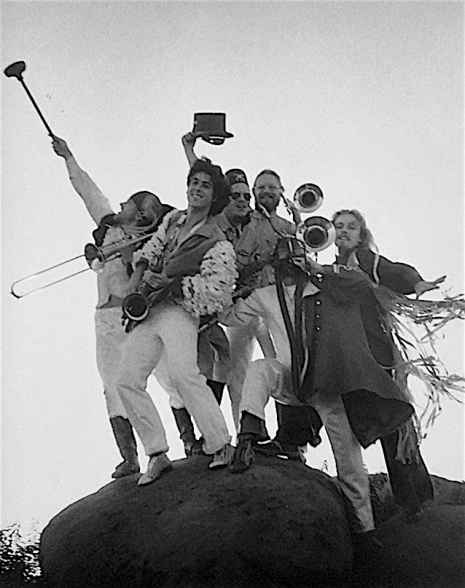
Rule #2: Start playing.
While Lil’ Orphan Ollie and his family moved to northern California to find work, his buddies from college kept the Roto-Rooter Good Time Christmas Band going. The line-up was: Sgt. Charts, Dr. Mabuse DOA, Off the Wallie, B-flat Baxter and Buffalo Steve. Sgt. Charts started organising the band into four trombones and four saxophones. The band covered “Flight of the Bumblebee,” Beethoven’s “Ninth,” and covers of tunes by artists like the Beatles. Wherever they played they brought happiness and joy and a hat full of dollars.
Lil’ Orphan Ollie: I left town and in the meantime I couldn’t keep the band from being contaminated with all these saxophone players and stuff. The trombone choir didn’t really exist for very long. They stated doing stuff on their own.
Sgt. Charts wrote and arranged music prolifically. He got the idea of doing a bunch of tunes like who’s going to write an abbreviated version of Beethoven’s Ninth for saxophone and trombones—that’s the kind of stuff Sgt. Charts would do.
They’d go up to the Observatory or Griffiths Park and play or let’s go over to the La Brea Tar Pits and put out a hat and play there.
I was up north with my family but it wasn’t working out up there and the band said, “Goddammit, you gotta come back and we’re going to do this thing.”
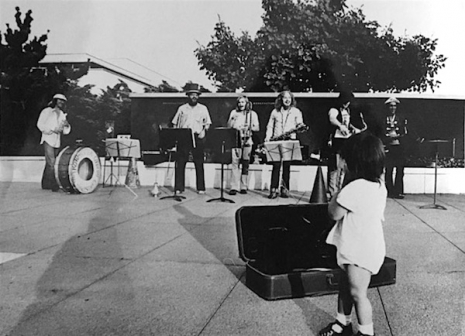
Lil’ Orphan Ollie: I left town and came back. In the meantime they’d started to do some of this stuff and I thought they were nuts. Everyone kept saying, “Come on, you gotta come back.” And I was saying, “I can’t do all this stupid shit on the street. How are you gonna make any money? You gotta be out of your mind.” But I came back and did it anyway.
I was raised as a straight, legitimate horn player and I was real serious. A lot of my work was classical. The rest of it was all big band stuff. So, who was going to put on a bunch of costumes? But the fact of the matter was it came at the right time and the right place and it worked. Next thing we knew we were getting some media attention.
Rule #3: Record a hit.
Playing the streets and getting coverage on the local news led to the Roto-Rooter Good Time Christmas Band making their first recordings.
Lil’ Orphan Olliee: Our first [record] was “March of the Cuckoos” the old Laurel and Hardy theme. That got to the top of the hit parade on Dr Demento’s Sunday evening show. A record only got to the top of the hit parade only by the number of phone calls they received requesting it, okay? We did this dumbass thing of “The March of the Cuckoos” and submitted it. Then we did our own phonecalling. It got to number one.
We were playing on the streets at La Brea Tar Pits and the TV guys immediately hit on us after getting the top spot on the Dr. Demento hit parade. Okay, we were definitely anti-establishment but we needed to get a hit.
And that’s basically how we got started.
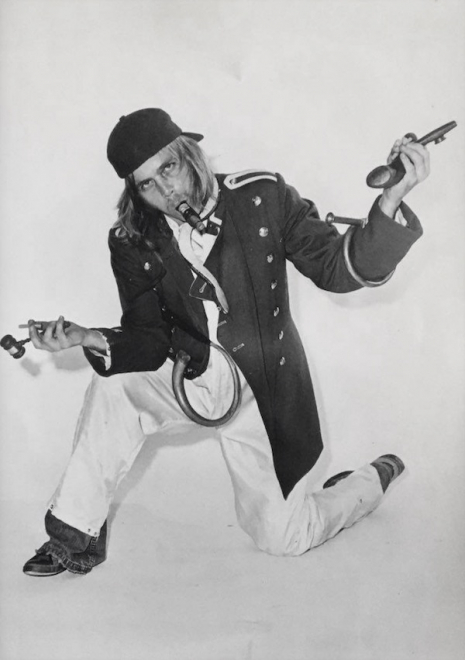
Lil’ Orphan Ollie getting started.
Rule #4: Sign to a label.
Lil’ Orphan Ollie: We got a record deal from Vanguard which is a recording society not even a record company in the sense that they had ever taken somebody and promoted them and supported them to do anything.
Everybody was passing on us and that first album we did was originally recording studio in Hollywood.
We went into the studio in 1974, at the corner of La Brea and Hollywood we had this beautiful sixteen-track recording studio.
We went in there and you know how bands record? They put down the basic tracks with guitar, bass and drums, then they put the horns over it. We recorded the basic tracks with horns and then sweetened them with drums and everything else. I’m a drummer as well as a horn player. Everybody played keyboards, and pretty much everybody played guitar but I don’t. Everyone doubled on a lot of instruments.
Our basic tracks were all six horns at that time. Later on we got into the four person model.
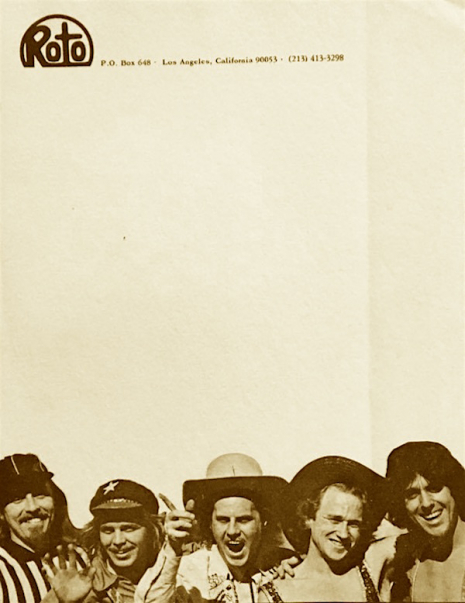
Rule #5: Stay true.
Lil’ Orphan Ollie: We started on the streets, we got some things together, then we got this one hit, then we got on to medal, then we started a lot of special events and stuff then we ended up having a permanent place at Busch Gardens, Van Nuys. Busch make all the beer in Los Angeles. Busch Gardens was a park with beautiful plants and trees and streams built around their brewery.
We had oddball vents and stuff. We played once a month at the Rose Bowl Swap Meet which was six hours, a half-hour on and a half-hour off, on the second Monday of every month for a couple of years. We got quite a following there. A gazillion people would show up for the Swap Meet.
We had popular spots but what we found was we were more successful on the streets than any money we made when people brought us in to play in a club.
We could make more in a hat than anyone could.
Rule #6:Tour, Tour, Tour.
Lil’ Orphan Ollie: We got on the road we started doing college concerts, and opening for different acts. You’re a six piece band and you’re still able to fill a lot of medium-sized you know maybe 4,000-6,000 seater theaters.
When we got down to a four-piece band we worked a club in St. Louis and we opened for AC/DC on their first American gig.
We became a four-piece band. Sgt. Charts was no longer working on the road. Dr Mabuse DOA and all of his humor and stuff was out. We still had a four-piece horn band. I was playing more drums and playing two or three tunes on trombone. We could play “Flight of the Bumblebee” and blow everyone away and then play really good pop tunes.
We had this band that played everything.
The bookings weren’t always right for us. We were playing Los Angeles and a guy who owns a bunch of clubs in Lincoln, Nebraska, booked us. We were a six-piece band at the time doing a lot more of the goofy stuff. We acted out The Wizard of Oz. Live. Doing all the voices in The Wizard of Oz overture. We would do literally insane stuff. This guy hired us to play his main club in Lincoln, Nebraska, which sold more Budweiser beer than any other club in the country. It only had Top 40 type of bands in it. We go in there blindly. We open with the “William Tell Overture,” you know the start of it with the dawn chorus. We’re all in goofy costumes. The crowd is seething. All they want is straight ahead jukebox Top 40 music. And we’re playing in among the crowd. And I stand up with a duck call. La-de-da-la-la-la…Quack. Before we can even hit the stage the audience wanted to kill us.
I wasn’t sure if the club owner had a sense of humor or he just wanted somebody in the band to die.
But we had the balls to do that kind of stuff.
Can you imagine going from the streets of LA to opening for AC/DC or Styx or the Band? Doing all original tunes with exception of the horns with “Flight of the Bumblebee”, Beethoven’s Ninth, to the “William Tell” overture,
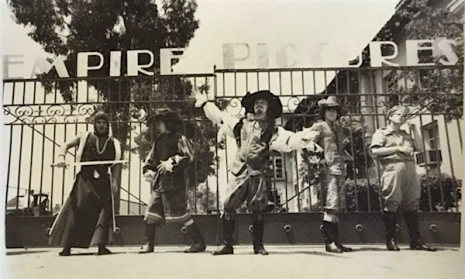
Rule #7: Get a manager.
Lil’ Orphan Ollie: Our main competition was Mystic Knights of the Oingo-Boingo which is Danny Elfman. The big huge resentment was they got professional management and we didn’t. But our writing ability and our arranging ability was every bit as good as his. But he got a more commercial track and we continued to be self-managed. And that’s what the difference was between the Mystic Knights of Oingo-Boingo and us.
We did some gigs together with them and we were very much the same in terms of musicianship and everything else but we drew much bigger crowds. If they put us on side-by-side at the Music Center they’d pack up and leave cause we would blow them off the streets.
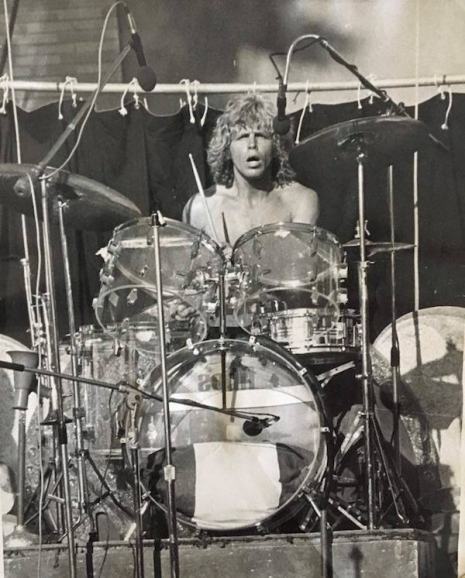
Ose on drums.
Rule #8: Stick together.
Lil’ Orphan Ollie: We became a four-piece band. Sgt. Charts was no longer working on the road. Dr Mabuse DOA and all of his humor and stuff was out. We still had a four-piece horn band. I was playing more drums and playing two or three tunes on trombone. We could play “Flight of the Bumblebee” and blow everyone away and then play really good pop tunes
Why we split up the four piece band after a great deal of success, was because there weren’t any record deals anymore because it was all about selling tunes.
We got a great offer from Vogue—two of the guys wanted it and two of the guys didn’t. The two that didn’t were the main song writers Off the Wallie and B-flat Baxter—two prolific songwriters and they wanted to make their own tunes their own hits as opposed to sell a couple of tunes and let somebody else make a hit and come back on the shirt tails.
We had so many tunes. So many styles. Those guys wrote great tunes.
All of us were really versatile.
It sadly broke up. Buffalo Steve and I could write but we were not the prolific songwriters that Off the Wallie and B-flat-Baxter were.
And Wallie and Baxter didn’t take the path of taking a publishing deal to sell a couple of tunes that somebody else makes a couple of hits and let us ride on that.
Rule #9: Advice.
Lil’ Orphan Ollie: If I was to recommend anything to someone who wants a music career—get a manager.
When it comes down to two voting for and two voting against and all of us had equal contributions—you need a manager.
With thanks to Lil’ Orphan Ollie.
Previously on Dangerous Minds:
Epic Martin Rev interview about his early life and the making of Suicide’s first album
Chocolate guitars and Billy MacKenzie: Alan Rankine talks about life in The Associates
After The Specials came the bittersweet pop of Fun Boy Three
The genius of Barry Adamson: Exclusive interview and DM premiere of ‘Sounds From The Big House’ Live